In This Episode << SLIDE LEFT TO SEE ADDITIONAL SEGMENTS
Holy Family Ministries
Rev. Leslie Hunter: I don’t know about you.
School children: I don’t know about you!
Rev. Hunter: But I’m ready for chapel.
School children: I’m ready for chapel!
JUDY VALENTE, correspondent: It may look like a pep rally, but at Holy Family Ministries they call this chapel—the Wednesday afternoon worship service. Outside these walls is one of the highest crime neighborhoods in Illinois. In here, the students are enthusiastic and well-behaved.
“God is good…”
VALENTE: Holy Family Ministries calls itself a new model for Christian education at a time when faith-based schools, especially those in the inner cities, struggle to stay alive.
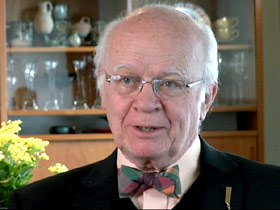 DR. MARTIN MARTY: They have always struggled, I think you’d say, but the only time they didn’t is when they were tied to a single congregation, a single parish, where every parent had a child, and they automatically supported it.
DR. MARTIN MARTY: They have always struggled, I think you’d say, but the only time they didn’t is when they were tied to a single congregation, a single parish, where every parent had a child, and they automatically supported it.
VALENTE: As neighborhoods change and congregations shrink, there aren’t enough students, parents, or dollars to support faith-based schools. Susan Work is president of Holy Family Ministries.
SUSAN WORK (President, Holy Family Ministries): These schools are the jewels of their neighborhood, and we need to save them. But we can only save them if we have economic models that are more sustainable than one parish, one school.
VALENTE: Holy Family Ministries dispensed with the traditional model of a church school to pass on doctrine. Instead, it created an umbrella organization that offers a variety of social programs in addition to classroom instruction. The idea isn’t to proselytize, but to instill ethics and values.
VALENTE: Holy Family started in 1985 as a small Lutheran school. It raised $7 million in private funds to build this facility three years ago. Today, Holy Family is a nonprofit social services center and an Episcopal charity, as well as a Christian school.
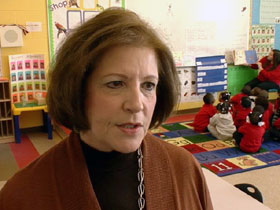 WORK: We’ve had census workers training in here, we have wedding receptions, we’ve had a lot of baby showers, birthday parties, funeral repasts, just all kinds of things. By having a not-for-profit entity over everything we could access some other sources of funding that we would not otherwise be able to attract if we just stayed as Holy Family Lutheran School, a private school.
WORK: We’ve had census workers training in here, we have wedding receptions, we’ve had a lot of baby showers, birthday parties, funeral repasts, just all kinds of things. By having a not-for-profit entity over everything we could access some other sources of funding that we would not otherwise be able to attract if we just stayed as Holy Family Lutheran School, a private school.
VALENTE: Only fifteen percent of Holy Family’s income comes from tuition. It gets the rest from private donors, grants, and government.
Voice on school intercom: “Good morning Holy Family….”
VALENTE: To tap into that broad donor base, Holy Family draws a careful line between its social programs, which receive funding from the government and other secular sources, and its faith-based school, where the day begins with prayer followed by a mission statement.
School children reciting mission statement: We, the students of Holy Family School, faithfully commit ourselves to spiritual growth and Christian values….
WORK: I love the mission statement because parents wrote it. The children pledge to listen to God, accomplish miracles, and be the best that they can be each and every day.
School children: … and to be the best we can be each and every day.
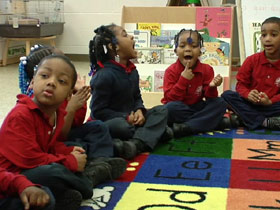 Classroom singing: “There are seven days, there are seven days, there are seven days in the week….”
Classroom singing: “There are seven days, there are seven days, there are seven days in the week….”
VALENTE: This is part of Holy Family’s secular outreach: a preschool program funded by the Chicago public schools.
WORK: Chicago Public Schools doesn’t really care where the program is delivered. They’re interest is in seeing that at-risk children all have a preschool experience that will prepare them for later success.
VALENTE: The preschool program has its own director and budget and offers no religious instruction or activities.
WORK: There’s a lot of research out right now about preschool that shows a correlation with later life outcomes. For example, lower rates of incarceration, lower dropout rates for high school, increased entrance into college.
VALENTE: Holy Family’s after-school programs, which emphasize fitness, and its nine-week summer camp are also secular. Both are funded by the government.
WORK: They are subsidies provided to parents to enable them to be out in the workforce. It subsidizes their childcare so that the parents can work.
Student: And now we have to do our multiples…
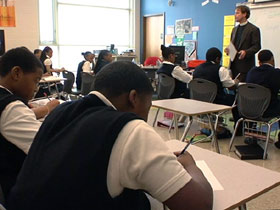 VALENTE: But from 8 am to 4 pm, Holy Family is a faith-based school for 200 children, kindergarten through eighth grade.
VALENTE: But from 8 am to 4 pm, Holy Family is a faith-based school for 200 children, kindergarten through eighth grade.
WORK: Teachers do what they’re comfortable with. We don’t impose a certain amount of religious activity in any teacher’s classroom.
VALENTE: Formal religious instruction takes place on Wednesdays.
Teacher: We’ve already talked about the spiritual life and our prayer life…
WORK: Our goal with every child is that they would have a personal relationship with God by the time they leave this school.
VALENTE: But the emphasis is on academics. Holy Family has a 100 percent graduation rate, and in the past five years nearly 90 percent of its students have gone on to either private high schools—with scholarships—or charter schools.
WORK: We want to turn out children of faith, but we know that those kids have to have skills. Otherwise, we’ve turned out wonderful human beings who don’t have a job.
VALENTE: This is what the Wednesday chapel service looks like.
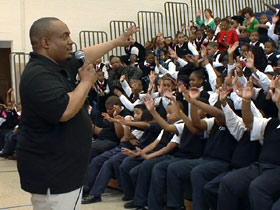 WORK: We’re not putting up any barriers that would keep people of various faiths from joining in the fun. We make faith development a very lively and attractive part of our program here, and we just try and keep it accessible to all the children, no matter what their background is.
WORK: We’re not putting up any barriers that would keep people of various faiths from joining in the fun. We make faith development a very lively and attractive part of our program here, and we just try and keep it accessible to all the children, no matter what their background is.
VALENTE: For the parents, religion is not the most important thing here. Martin Marty:
MARTY: They simply want the best education for their child. Trust is the big thing. They trust them to affirm the best in the family values. The schools are usually small enough that the teachers get to know everyone.
VALENTE: Tuition is $7200, but the school pays more than half of that and must raise more than a million dollars a year to do it. At events like this it tries to broaden its donor base by touting Holy Family as an investment in the community.
CHERYL COLLINS (Principal, Holy Family School): It’s safe, it’s affordable, it’s faith-based, and Holy Family gets results. It’s not uncommon at 3:00 to hear sirens instead of school bells in our neighborhood, and the sirens are going to these schools because there are gang fights and gang activity that take place.
Malik: My name is Malik and I’m in fourth grade.
VALENTE: To reach more affluent people Holy Family put its development office 30 miles away in the prosperous suburbs of Chicago’s North Shore. Half its income comes from donors, and that includes more than thirty congregations in the Chicago area.
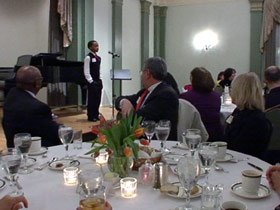 Malik: Teachers and tutors help us, and then we can make better grades. I know, because I have been on the honor roll many times.
Malik: Teachers and tutors help us, and then we can make better grades. I know, because I have been on the honor roll many times.
VALENTE: Michael Berkowitz is a business leader who caught the Holy Family spirit.
MICHAEL BERKOWITZ: It’s not about the faith ofwhat I believe in or what the students believe in. It’s the fact of the goodness that’s being done here. It has nothing to do with the religion, as far as why I would contribute my time and money. It has to do with how well they are treating students.
VALENTE: Martin Marty thinks other faith-based schools, including those that are Catholic, would do well to emulate Holy Family’s approach.
MARTY: I think the model of the faith-based schools would be an excellent model for Catholicism. They are just seeing their parochial schools die by the hundreds across the nation every year. I’ve been spending enough of my life on campuses to know how conservative, structurally, educational institutions are. If we’ve always done it that way, it’s awfully hard to think of the new.
Singing at service: “Lean on me…”
WORK: Sure, we’re one school, but we’re turning out leaders for the community for tomorrow. We’re turning out the kids who are going to be able to finish college—not just get in, but finish—and have good careers.
Singing: “Lift every voice…”
WORK: Also, I think we’re affecting the community in a less measurable way by the symbol of hope and optimism that we have brought into this neighborhood.
VALENTE: Supporters of Holy Family believe that as long as it can keep the lights on and the books open it can transform this part of the city—one child at a time.
For Religion & Ethics NewsWeekly I’m Judy Valente in Chicago.

